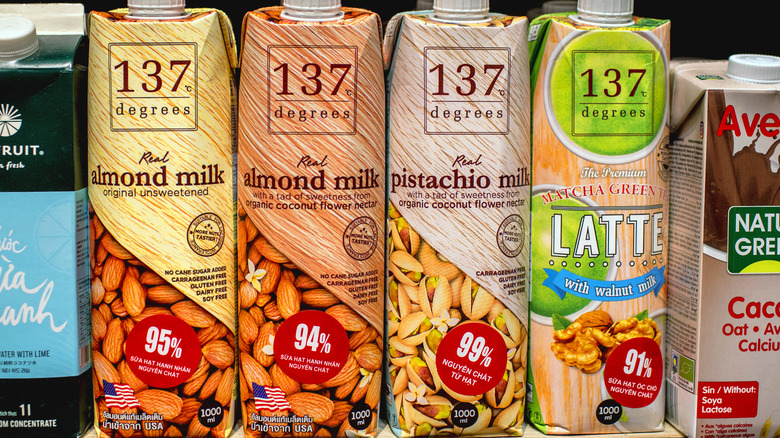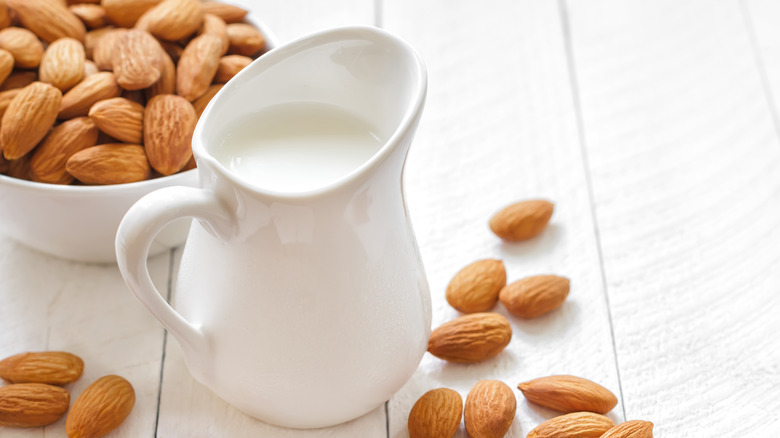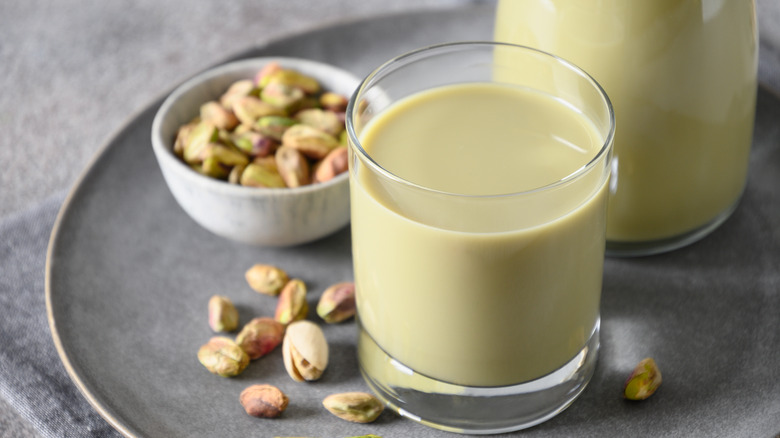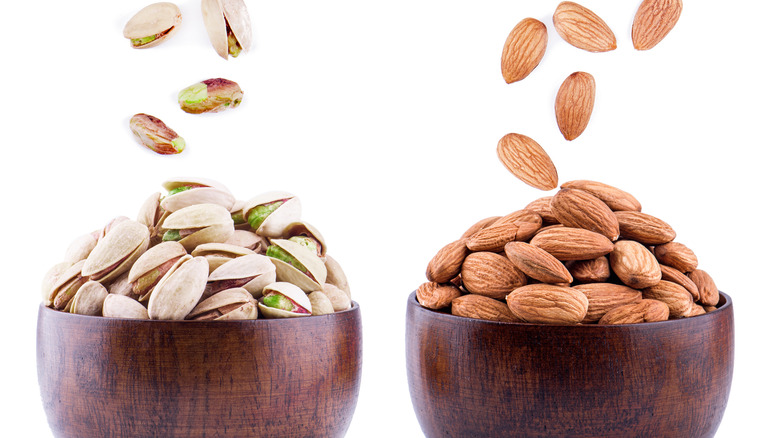Nutritional Differences Between Pistachio And Almond Milk
With so many kinds of nut milk on the market, picking the right one can be downright tricky. Do we go for the well-known, more established almond milk? Or, do we reach for the much newer (yet undoubtedly delicious-sounding) pistachio milk, instead? Perhaps the best way to make the choice is by getting down to what really matters: their nutritional value.
According to Vegan Food & Living, almond milk has been around for hundreds of years, with the first known reference to it stemming back to the 13th Century. Though the drink is thought to have originated in the Middle East, it has a pretty lengthy history in Europe, too, dating back to at least the 1300s. Having said that, its popularity has soared in recent years. Vegan Food & Living reports that in 2013, almond milk outsold soya milk, and in 2016, data company NielsenIQ revealed that between 2011 and 2016, sales grew by an eye-watering 250%. By contrast, pistachio milk is a much newer invention, generally attributed to the founder of Táche pistachio milk, Roxana Saidi.
As noted on the Táche website, Saidi was drawn to the option when she realized it used less water than almond milk, and the almond industry in general. That would certainly make pistachio milk an environmentally friendly option. However, when it comes to health benefits for those drinking it, our question remains. In terms of nutritional benefit, how does the newbie nut milk compare to its age-old precursor?
Almond milk is packed with Vitamin E
It makes sense that almond milk has been used for hundreds of years: this dairy alternative is packed with important nutrients.
According to Medical News Today, almond milk is high in Vitamin E. Healthline actually points out that by consuming just 3.5 ounces of almond milk, people can reach a whopping 22% of their daily Vitamin E requirements. That's definitely nothing to sniff at. After all, per Mayo Clinic, that particular nutrient is essential for good blood and brain health, and is important for the reproductive system, too. Healthline also notes that Vitamin E can play a major role in preventing a ton of serious diseases, like cancer.
And, that's not all. Almond milk is also great for regulating blood sugar. CleanPlate explains that comes down to the milk's minimal carbohydrate content — and that the result is possible protection from diabetes. But wait, there's (still) more! Per Vegan Food & Living, almond milk contains fiber, making it a great choice for those who struggle with digestive issues. In other words, when you reach for almond milk, you're not just getting a delicious cup of coffee: you're also getting a pretty nutritious kick.
Pistachio milk is also pretty impressive
Like almond milk, pistachio milk contains a ton of fiber. In fact, Pistachio Milk points out that it actually has higher fiber content than its almond-based counterpart. Another benefit? High protein content. Per Pistachio Milk, a serving of the newbie nut milk contains double the amount of protein found in almond milk. Oh, and when it comes to Vitamin B6 — which WebMD touts as essential for brain health — pistachio milk is the clear victor. In fact, Pistachio milk notes that almond milk doesn't even contain the nutrient, while pistachio milk is chock full of it.
Having said that, when it comes to the other numerous benefits of almond milk, pistachio milk falls a little short. In a comparison piece weighing up the benefits of both, Pistachio Milk explained that the drink derived from everyone's favorite green-hued nuts didn't come close to almond milk in terms of Vitamin E content.
Another thing to take into account, as noted by Shape, is the sugar typically added to both milks. According to the outlet, it's more than possible to find almond milk brands that don't add sugar. When it comes to pistachio milks, however, most brands add some sweetness. Though dietitian Kelly Gans told Shape that the specific amounts added weren't off the charts, she also urged consumers to, "Ask yourself: Is it necessary?" If not, Gans suggested going the DIY route with pistachio milk.
Neither nut is as nutritious in milk form
Here's the thing: even though there are obvious benefits to both pistachio and almond milk, if it's nutrients you're after, the milks made from them aren't exactly the best port of call. In fact, speaking to Shape, Kelly Gans made a point of noting that once they've been blended down, both almonds and pistachios lose some of their nutritional value. "I think a lot of people are like, 'Oh, I can just drink my nuts now,' and I don't really think it's the same. You're not going to get all the nutrients in a glass," the dietitian explained.
There's also the issue of just how much of either nut consumer is actually getting in each serving. Sure enough, in their profile on pistachio milk, CookingLight pointed out that the nut only makes up three percent of the drink. Likewise, LiveScience argued that the amount of almonds going into the average carton of almond milk was probably around two percent, with water being the main ingredient.
So, how do almond and pistachio milks stack up against each other, nutritionally? Almond milk certainly seems like the way to go. However, if it's really nutrition you're after, your best bet would be scoffing the nuts themselves.



